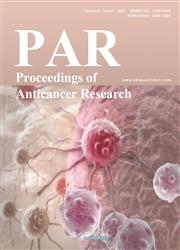In Silico Evaluation of Potential Ligands of Cancer Cells for Surfactin from Bacillus spp.
引用次数: 0
Abstract
Cancer is one of the most prevalent diseases worldwide, which causes significant morbidity and mortality. Designing and developing a potential anti-cancer drug is an active field of research worldwide. Microorganisms have been considered a potential source of anti-cancer drugs. One such microbe-derived compound is surfactin, which shows potential anti-cancer activities. In this study, we evaluated the binding potential of surfactin with several cancer cell ligands via an in-silico approach. Hence, molecular docking studies were performed to test the binding potential of surfactin against four targets. The analyses revealed that surfactin from Bacillus sp. can bind with the targeted ligands (coenzyme A, D-leucine, glycerol, and (R)-3-hydroxytetradecanal) with significant affinity. Surfactin showed the highest binding affinity (-7.7 kcal mol-1) to coenzyme A among the targeted ligands. These results may be useful for developing anti-cancer drugs. Nevertheless, further experimental studies are needed to investigate the ligand binding capacity and anti-cancer potential of such surfactin-like molecules.芽孢杆菌表面素癌细胞潜在配体的硅评价。
癌症是世界上最常见的疾病之一,它会导致严重的发病率和死亡率。设计和开发一种潜在的抗癌药物是世界范围内一个活跃的研究领域。微生物被认为是抗癌药物的潜在来源。其中一种微生物衍生的化合物是表面活性物质,它显示出潜在的抗癌活性。在这项研究中,我们通过硅方法评估了表面活性素与几种癌症细胞配体的结合潜力。因此,进行了分子对接研究,以测试表面活性素对四个靶标的结合潜力。分析表明,来自芽孢杆菌的表面活性素可以与靶向配体(辅酶A、D-亮氨酸、甘油和(R)-3-羟基十四烷醛)以显著的亲和力结合。在靶配体中,表面肌动蛋白对辅酶A的结合亲和力最高(-7.7kcal mol-1)。这些结果可能对开发抗癌药物有用。然而,还需要进一步的实验研究来研究这种表面活性素样分子的配体结合能力和抗癌潜力。
本文章由计算机程序翻译,如有差异,请以英文原文为准。
求助全文
约1分钟内获得全文
求助全文

 求助内容:
求助内容: 应助结果提醒方式:
应助结果提醒方式:


